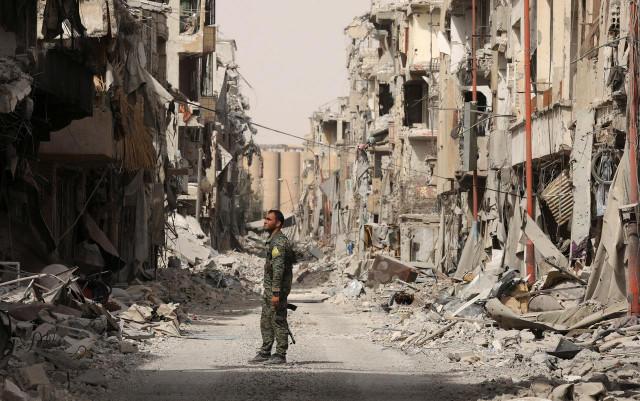The ‘great game’ in Syria
Despite reduction in violence about 2.1m children are out of school, 83% is living below the poverty line

PHOTO: REUTERS
Since the civil war broke out in March 2011, the Syrian people have suffered from a grim array of violations including fatal torture, rape of men and women, forced marriages, internal displacement, relocation to contiguous countries and killing by barrel bombs, scuds and chemical weapons.
Beneath the swarming bullets, missiles and fighter jets of government, opposition factions and international coalitions seeking to compound their control in the region — the civilian death toll in Syria has reached 225,948 including 28,949 children and 28,011 women by September 2019, and there are no signs of stoppage anytime soon. According to the Syrian Network for Human Rights (SNHR) data, Syrian regime forces and Iranian militias were responsible for 90% of the civilian deaths. In a December 2018 report, the group found that at least 560,000 people were killed in Syria including civilians and the parties fighting on Syrian soil.
Despite the reduction in violence in the past year and 5.7 million refugees and 6.2 million IDPs, about 2.1 million children are out of school and 13.2 million people need health assistance, 33% of the population is food insecure and 83% is living below the poverty line.
After Erdogan and Putin, with ratification from Assad, struck a deal on pushing back Kurd forces in northern Syria and establishing a buffer zone, Syrians hoped the rival countries would restore peace and initiate steps to rehabilitate IDPs and evacuees. But with the US keeping 600 military men to secure Syrian oilfields, Russia deployed troops and attack helicopters at a northern Syrian airbase formerly held by the US and Turkey. Additionally, having obtained control over Syria’s largest and deep-water Tartus port for 49 years, Russia has ensured its presence in the eastern Mediterranean Sea.
Flashback to 1971, Assad’s father Hafez al Assad signed an agreement with former USSR to use the Tartus port in return for selling advanced weapons to Syria. By 1990, Damascus owed $13.4 billion to Moscow and eventually agreed to concede its control of the port following Russia writing off 75% of the debt in 2005.
As President Trump said in 2017, the US had “very little to do with Syria other than killing IS” and vindicated his decision of troop withdrawal in December 2018 after defeating Daesh there. He is not prepared to fulfil his promise to finish America’s “endless wars” despite killing top ISIS leadership. Although US repetitively reprimanded Assad’s human rights violations in Syria, it has been disinclined towards direct involvement, except for firing 59 Tomahawk missiles on a Syrian airbase in April 2017, over the suspected use of chemical weapons by Assad forces.
Iran strongly supported the Assad regime since the violence began and provided extensive military aid to the Syrian government.
On September 23, the International Coalition against ISIS entered its sixth year. Since the onset, it provided support to specific armed factions to achieve objectives. Therefore, after a five-year military campaign, irrespective of Daesh’s incomplete elimination, the coalition controls 70% of Syria’s oil and gas reserves and nobody cares for the civilians.
Consequently, millions of Syrians are entombed amid the rivalry of geopolitical and strategic regional and global players.
The “great game” is, therefore, crucifying and routing Syrians citizens as they increasingly become victims of “national interests” of their own administration and foreign interlopers, and continue to suffer from mass casualties, rapes, displacements, rising poverty and loss of access to basic human needs.
Published in The Express Tribune, November 21st, 2019.
Like Opinion & Editorial on Facebook, follow @ETOpEd on Twitter to receive all updates on all our daily pieces.
















COMMENTS
Comments are moderated and generally will be posted if they are on-topic and not abusive.
For more information, please see our Comments FAQ